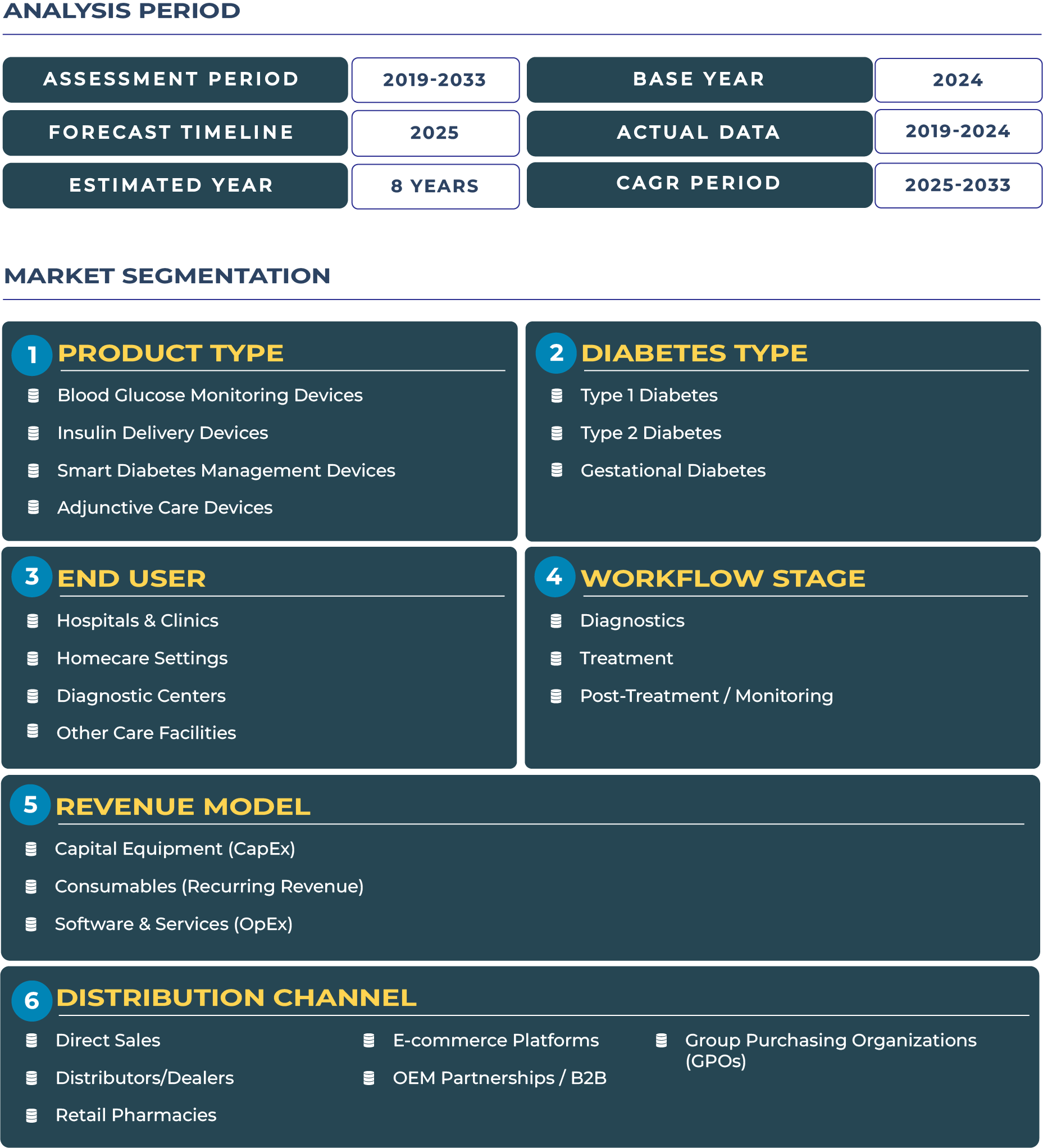South Korea Diabetes Care Devices Market Outlook: Co-Development as the Fastest Route to Credibility in South Korea
In South Korea, diabetes care devices are not only expected to meet regulatory requirements but also to align with the country’s unique K-Tech co-development model. Unlike other markets, South Korea values collaborative innovation between local medtech manufacturers and international companies to build rapid credibility and shorten the path to patient adoption. The Ministry of Health and Welfare has prioritized digital healthcare expansion, which has accelerated pilots of continuous glucose monitoring (CGM) systems, smart insulin pens, and hospital-linked platforms. In 2025, the South Korea diabetes care devices market is estimated at USD 672.7 million, projected to reach USD 994.8 million by 2033, growing at a CAGR of 5.0%. This steady growth reflects both rising disease prevalence and the country’s readiness to integrate advanced devices into everyday care. By leveraging local hospital collaborations and co-engineering pilots, global medtech players can reduce barriers to entry and align with South Korea’s fast-paced digital health ecosystem.
Drivers & Restraints: Examining the Forces Shaping Market Momentum
The South Korea diabetes care devices industry benefits from several strong drivers that differentiate it from neighboring markets. A tech-forward population, coupled with one of the world’s highest smartphone penetration rates, accelerates adoption of connected devices, especially CGMs and insulin pumps integrated with mobile apps. Additionally, South Korea’s strong manufacturing base in medical technology supports local R&D, enhancing cost efficiency and product reliability. Collaborations between universities, hospital groups, and medtech firms foster rapid clinical trial execution, ensuring devices meet both domestic and global standards.
However, the sector faces notable restraints. South Korea has a smaller domestic market compared to larger Asia-Pacific economies, limiting the revenue ceiling for some niche product categories. Price sensitivity is also a challenge, as reimbursement pathways often require lengthy negotiations, delaying broader market penetration for premium smart insulin delivery devices. Moreover, geopolitical tensions in the region create external uncertainties that can influence healthcare investment and consumer sentiment. Overall, the market grows at a balanced pace, with its unique combination of tech-readiness and policy hurdles shaping its trajectory.
Trends & Opportunities: Building a Digitally Integrated Diabetes Care Future
One of the most defining trends in the South Korea diabetes care devices landscape is the high level of digital integration in healthcare. Hospitals in Seoul, Busan, and Incheon are at the forefront of piloting closed-loop insulin systems that link with hospital EMR platforms, offering clinicians real-time data for improved patient outcomes. The government’s push for digital health innovation has created fertile ground for expanding mobile-linked blood glucose monitors and CGMs, reinforcing South Korea’s role as a digital-first healthcare hub.
Opportunities lie in connected device adoption, especially in remote patient monitoring for its aging population. Partnerships with national hospital networks allow companies to introduce innovative devices that support long-term outcome tracking. Startups and multinationals alike are positioning themselves in co-development initiatives that integrate AI analytics into diabetes management, enabling predictive alerts and personalized dosing. These opportunities ensure that South Korea continues to serve as a testbed for advanced diabetes care solutions before scaling globally.
Competitive Landscape: Local Pioneers and International Collaborators Driving Change
The South Korea diabetes care devices sector is characterized by the synergy between local champions and global leaders. i-SENS, a homegrown medtech firm, exemplifies this leadership. In November 2023, i-SENS launched the CareSens Air CGM system, marking a significant step in domestic CGM innovation. Global players such as Medtronic and Abbott continue to expand by co-developing solutions with Korean hospitals, leveraging local credibility for faster adoption. Strategies revolve around reimbursement approvals and clinical trial participation, as co-development with local partners shortens the health technology assessment (HTA) process and secures hospital-driven uptake. Multinationals are increasingly aligning with South Korea’s medtech manufacturing ecosystem, recognizing the importance of localization to win trust and scale adoption in this competitive and innovation-driven market.







